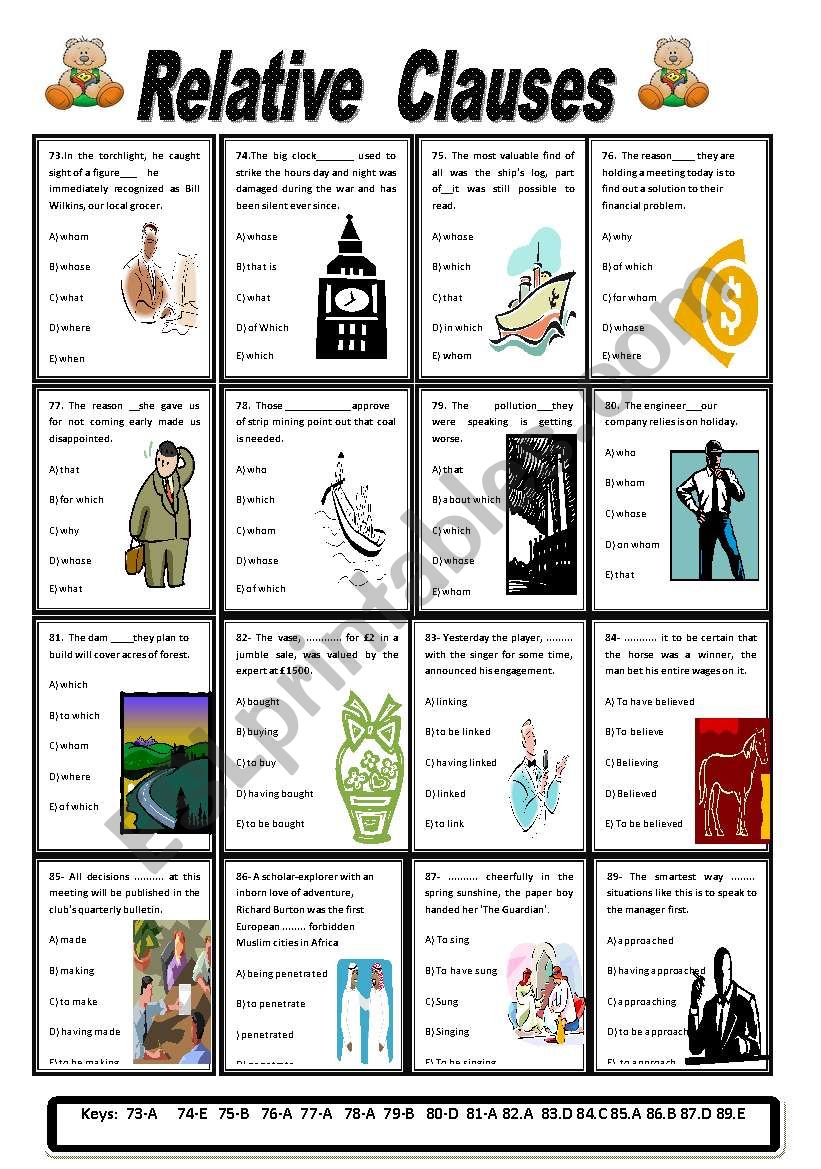Relative Clauses : definite relative clause - Liberal Dictionary / In english, there are two types of relative clauses:
Relative Clauses : definite relative clause - Liberal Dictionary / In english, there are two types of relative clauses:. A relative pronoun is a word like that or which or who, so a relative clause is a clause that begins with a relative pronoun. It has a subject and verb, but can't stand alone as a sentence. A relative clause is a subordinate clause that contains the element whose interpretation is provided by an expression on which the subordinate clause is grammatically dependent. A relative clause is a clause that begins with a relative pronoun. It is sometimes called an adjective clause because it functions like an adjective—it gives.
Defining relative clauses (also called identifying relative clauses or restrictive relative clauses) give detailed information defining a general term or expression. It comes after the noun defined by a basic sentence. Relative clauses can cause trouble in english, specially when they begin with less common forms of the pronoun who, such as whom? Relative pronouns and relative clauses connect two ideas into one sentence. What exactly is a relative clause and how can it be used?

They commonly qualify or give more information about a noun.
What exactly is a relative clause and how can it be used? Lord thompson, who is 76, has just retired. When to use which and. A relative clause is a sentence describing a noun, however, it cannot be used separately. Since relative pronouns are an essential part of relative clauses, let us first discuss what relative pronouns are. They commonly qualify or give more information about a noun. A relative clause is a clause that usually modifies a noun or noun phrase and is introduced by a relative positioning relative clauses unlike prepositional phrases, restrictive relative clauses. This is why they are also known as adjective clauses. A relative pronoun is a word like that or which or who, so a relative clause is a clause that begins with a relative pronoun. Defining relative clauses are not put in. It is sometimes called an adjective clause because it functions like an adjective—it gives. Relative clauses can cause trouble in english, specially when they begin with less common forms of the pronoun who, such as whom? This is the house which jack built.
Defining relative clauses don´t use commas and provide necessary information to. This is why they are also known as adjective clauses. In english, there are two types of relative clauses: A relative pronoun is a word like that or which or who, so a relative clause is a clause that begins with a relative pronoun. They commonly qualify or give more information about a noun.

A relative clause is a clause that usually modifies a noun or noun phrase and is introduced by a relative positioning relative clauses unlike prepositional phrases, restrictive relative clauses.
In english, there are two types of relative clauses: In the sentence the dragon who breathed blue fire has retired. Lord thompson, who is 76, has just retired. This is the house which jack built. What exactly is a relative clause and how can it be used? Relative clauses allow us to provide additional information without having to start a new sentence. They commonly qualify or give more information about a noun. A relative clause is one kind of dependent clause. Defining relative clauses are not put in. It comes after the noun defined by a basic sentence. Relative clauses tell us more about people and things: Relative pronouns and relative clauses connect two ideas into one sentence. Since relative pronouns are an essential part of relative clauses, let us first discuss what relative pronouns are.
Relative pronouns and relative clauses connect two ideas into one sentence. When to use which and. A relative clause is a sentence describing a noun, however, it cannot be used separately. A relative clause is a clause that begins with a relative pronoun. Relative clauses can cause trouble in english, specially when they begin with less common forms of the pronoun who, such as whom?
It comes after the noun defined by a basic sentence.
This is why they are also known as adjective clauses. It has a subject and verb, but can't stand alone as a sentence. A relative clause is a subordinate clause that contains the element whose interpretation is provided by an expression on which the subordinate clause is grammatically dependent. It comes after the noun defined by a basic sentence. A relative clause is a clause that begins with a relative pronoun. In this article, we are going to take a look at the answers to both of these questions by looking at some examples of relative clauses in use. Lord thompson, who is 76, has just retired. The relative pronoun is the subject the relative clause can come after the subject or the object of the sentence. Relative clauses can cause trouble in english, specially when they begin with less common forms of the pronoun who, such as whom? When to use which and. Relative clauses follow whatever it is that they are qualifying. This is the house which jack built. Relative pronouns and relative clauses connect two ideas into one sentence.
Komentar
Posting Komentar